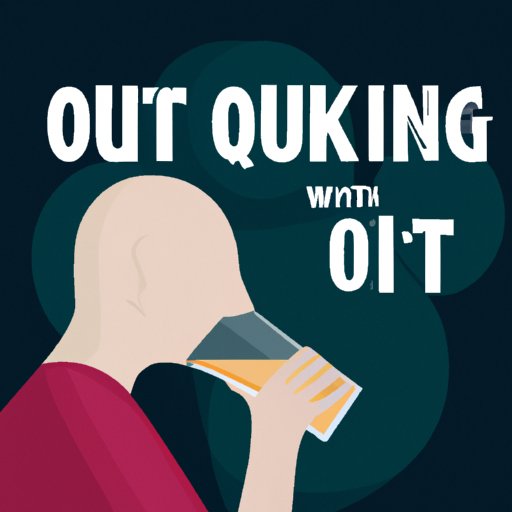
Introduction
Alcohol use disorder affects millions of people worldwide, and quitting can be a challenging, yet life-changing decision. If you are struggling to quit drinking, you are not alone. In this article, we will explore different methods for quitting alcohol, tips for how to stick with them, and where to seek support along the way.
The Cold Turkey Method
The cold turkey method is the practice of abruptly quitting alcohol without tapering off. This can be a difficult method and can lead to intense withdrawal symptoms. However, for those who are able to get through the initial stage, it can lead to quicker and more decisive results.
Pros of Cold Turkey Method:
- It can lead to an immediate break from alcohol consumption and dependency.
Cons of Cold Turkey Method:
- It can cause intense withdrawal symptoms like shaking, sweating, and nausea.
- It can be hard to maintain sobriety in the long term.
If you decide to use the cold turkey method, prepare yourself mentally and physically for the withdrawal period by keeping yourself hydrated, engaging in relaxing activities, and connecting with a support system.
Gradually Reducing Alcohol Intake
Gradual reduction involves slowly tapering off alcohol consumption over time. This method is less intense and is designed to make the quitting process less challenging.
Pros of gradual reduction:
- It can make withdrawal symptoms easier to manage.
- It can help prevent relapse by easing the transition into sobriety.
Cons of gradual reduction:
- It may take longer to quit alcohol completely.
- It may not be effective for those with severe cases of alcohol use disorder.
To gradually reduce alcohol intake, start by setting a realistic goal for yourself, such as reducing the number of drinks per week, and track your consumption in a journal or app. Consider asking a support partner to help you stay accountable.
Find Support
Quitting alcohol is more successful when you have a strong support system. Having people you can confide in, or a group who have gone through the same experience as you, can help keep you motivated and accountable.
First, consider seeking support from friends or family members who are supportive and understanding. If that is not enough, try finding support groups such as Alcoholics Anonymous (AA) or other related groups. These groups provide a built-in support system, accountability, and fellowship while also offering practical advice and resources for those quitting alcohol.
Remember, the journey to sobriety can be bumpy – seeking help from others who have gone through a similar experience can help make the process easier.
Identify Triggers
Triggers are situations or emotions that can lead to alcohol consumption. Identifying your triggers is critical to successfully quitting alcohol, as it helps one to anticipate and avoid situations that may lead to a relapse.
Some common triggers include being around friends who drink, anxiety, and stress. Reflect on your past alcohol consumption and identify when, where, and why you drank. This will help you avoid those situations or emotions that may lead to a relapse.
Strategies for managing triggers include practicing mindfulness, replacing the trigger behavior with healthy habits, and creating an action plan for when you experience a trigger. Always remember to be patient with yourself and keep trying new techniques until you find what works best for you.
Fill Your Time with Healthy Activities
Quitting alcohol can cause a void in your free time, and it is important to fill that void with healthy activities. Engaging in positive and productive habits can help keep you motivated and occupy your time and mind.
Activities to consider include regular exercise, reading, and writing, pursuing a hobby or interest, attending social events that do not involve alcohol, and volunteering. Start by exploring different activities and find what works best for you.
Seek Professional Help
In some cases, quitting alcohol may require professional help. Mental health professionals such as therapists or addiction counselors can provide support, guidance, and additional resources.
When seeking professional help, consider working with someone who specializes in alcohol use disorder and has a similar approach to treatment as you do. There are various forms of professional healthcare, such as residential treatment programs or outpatient counseling services. The right type of care for you depends on the severity and complexity of your case.
Be Patient and Kind to Yourself
Quitting alcohol is not easy, and progress may be slow at times. It is important to remember to be patient and kind to yourself throughout the process.
Celebrate your progress, no matter how small, and don’t let setbacks discourage you. Remember that making mistakes is a natural part of the journey and does not define your overall success. Keep reminding yourself of the improvements you’ve made and take it one day at a time.
Conclusion
Quitting alcohol can be a challenging but rewarding journey. Methods for quitting alcohol range from the cold turkey method to gradually reducing intake. Seeking support, identifying your triggers, filling your time with healthy activities, and seeking professional help are all effective strategies to quit drinking. Remember to be patient and kind to yourself throughout the process, celebrate progress, and continue seeking help if necessary.





